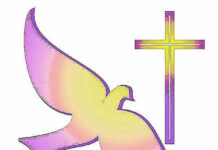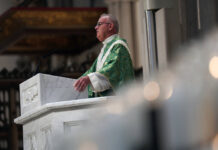During Sunday rites, worshippers in the Orthodox Church in America are led through a tour of the faith’s music, with hymns from Russia, Romania, Georgia, Bulgaria and beyond.
The faithful know many by heart, including the ancient Trisagion hymn — “Holy God, Holy Mighty, Holy Immortal, have mercy on us” — in a haunting setting that for centuries has simply been called “Kievan Chant.”
With Great Lent approaching, Archbishop Alexander Golitzin of the Diocese of Dallas and the South instructed parishes (including my own in East Tennessee) to add prayers for Ukraine in every Divine Liturgy: “Again, we ask Thy great mercy on our brothers and sisters who are presently involved in conflict. Remove from their midst all hostility, confusion and hatred. Lead everyone along the path of reconciliation and peace.”
The OCA’s Metropolitan Tikhon, leader of a church that began with Russian missionary work in 1794, has urged that “hostilities be ceased immediately and that President Putin put an end to the military operations. As Orthodox Christians, we condemn violence and aggression.”
In Slavic Orthodox history, all roads lead to Kiev, now called Kyiv in the West.
Orthodox leaders with ties to the European Union, and to highly European Western Ukraine, have issued fierce statements after the Russian invasion. Metropolitan Epiphanius I of the independent Ukrainian Orthodox Church, launched in 2018 by Ecumenical Patriarch Bartholomew of Istanbul, has said the “spirit of the Antichrist operates in the leader of Russia.”
However, it’s significant that leaders of many Orthodox churches with roots in Russian Orthodoxy have also condemned the invasion and urged a ceasefire. The leader of Ukraine’s oldest Orthodox body — one with centuries of ecclesiastical ties to Moscow — condemned the invasion in a statement addressed directly to Vladimir Putin.
“Defending the sovereignty and integrity of Ukraine, we appeal to the President of Russia and ask him to immediately stop the fratricidal war,” said Metropolitan Onuphry, primate of Kyiv and All Ukraine. “The Ukrainian and Russian peoples came out of the Dnieper Baptismal font, and the war between these peoples is a repetition of the sin of Cain, who killed his own brother out of envy. Such a war has no justification either from God or from people.”
Metropolitan Onuphry, a native of Western Ukraine, added: “I call you, above all, to intensified penitential prayer for Ukraine, for our army and our people, and I entreat you to lay aside mutual strife and misunderstandings and unite in love for God and our motherland.”
The synod of bishops went further, urging Patriarch Kirill of Moscow and All Russia to personally seek “cessation of fratricidal bloodshed on Ukrainian land, and to call on the leadership of the Russian Federation to immediately stop the military actions that are already threatening to turn into a world war.”
The synod added: “Bringing nuclear weapons to a state of high combat readiness in general sharply calls into question the prospects for the further existence of mankind.” Praising those defending Ukraine, the bishops said their sacrifice is a powerful testimony to “how it’s possible to fulfill the words of our Lord Jesus Christ: Greater love hath no man than this, that a man lay down his life for his friends.”
Meanwhile, inside Russia, numerous Orthodox priests and abbots — 200-plus early this week, speaking “each on our own behalf” — began signing an online petition calling for the “cessation of the fratricidal war in Ukraine” and urging negotiations. “We respect God-given human freedom, and we believe that the people of Ukraine should make their choice independently, not at gunpoint, without pressure from the West or the East,” said the text.
Noting that this was written after the Sunday of the Last Judgment on the Orthodox calendar, they added: “The Last Judgment awaits every person. No earthly authority, no doctors, no guards will protect from this judgment. Concerned about the salvation of every person who considers himself a child of the Russian Orthodox Church, we do not want him to appear at this judgment bearing the heavy burden of mothers’ curses.
“We remind you that the Blood of Christ, shed by the Savior for the life of the world, will be received in the sacrament of Communion by those people who give murderous orders not into life, but into eternal torment.”
The petition closed with: “Stop the war.”




